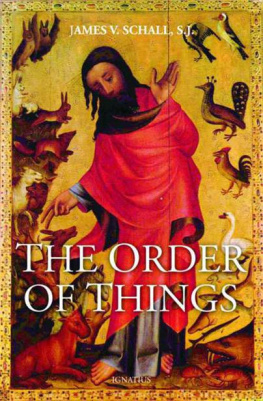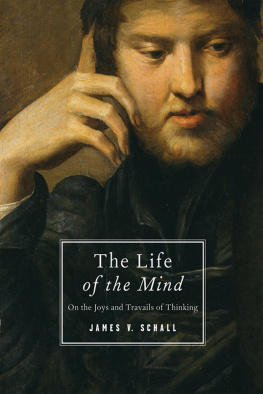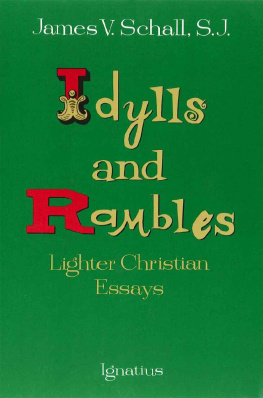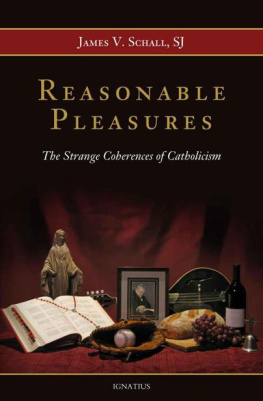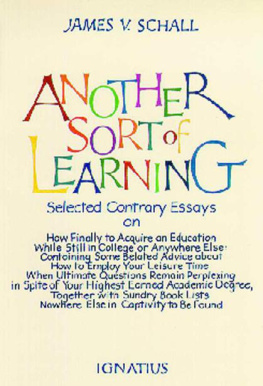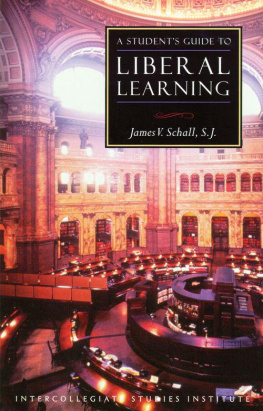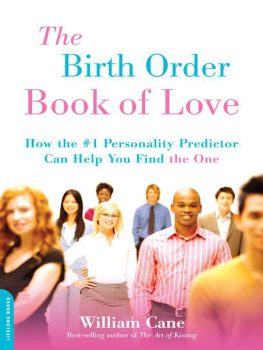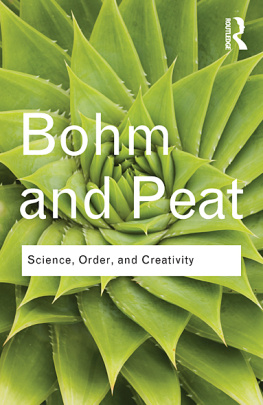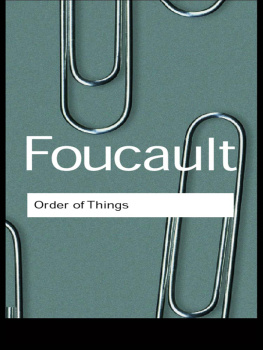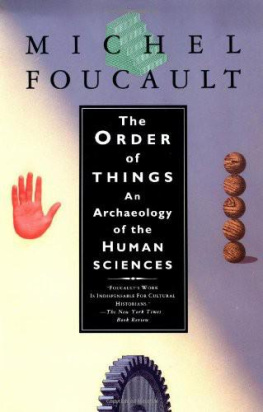THE ORDER OF THINGS
JAMES V. SCHALL
THE ORDER
OF THINGS
IGNATIUS PRESS SAN FRANCISCO
Cover art: Master Bertram, The Creation of the Animals.
Panel from the Grabow Altarpiece at the St. Petri Church in Hamburg, 1379-1383.
Bildarchiv Preussischer Kulturbesitz / Art Resource, N.Y.
Cover design by John Herreid
2007 Ignatius Press, San Francisco
All rights reserved
ISBN 978-1-58617-197-1
Library of Congress Control Number 2006939355
Printed in the United States of America
Isnt it one great predicament not to let them [potential philosophers] taste of arguments while they are young? I suppose you arent unaware that when lads get their first taste of them, they misuse them as though it were play, always using these to contradict and imitating those men by whom they are refuted. They themselves refute others, like puppies enjoying pulling and tearing with argument at those who happen to be near.... Then when they themselves refute many men and are refuted by many, they fall quickly into a profound disbelief of what they formerly believed. And as a result of this, you see, they themselves and the whole activity of philosophy become the objects of slander among the rest of men.
Plato Republic 539b-c
The voyage which I was born to make in the end, and to which my desire has driven me, is towards a place in which everything we have known is forgotten, except those things which, as we knew them, remind us of an original joy.
Hilaire Belloc, The Harbour in the North, in Hills and the Sea, 218-19
As the Philosopher says in the beginning of the Metaphysics, it is the business of the wise man to order. The reason for this is that wisdom is the highest perfection of reason, whose characteristic is to know order. Even if the sensory powers know something absolutely, nevertheless, it belongs to the intellect or reason alone to know the order of one thing to another. Now, a twofold order is found in things. One, of parts of a whole or of a multitude among themselves, as parts of a house are mutually ordered to one another. The second order is that of things to an end. This order is of greater importance than the first....
Now order is related to reason in a fourfold way. There is one order that reason does not establish but only considers, such as the order of things in nature (metaphysics, physics). There is a second order that reason, in considering, establishes in its own act; for example, when it arranges its concepts among themselves and the signs of concepts, since they are sounds that signify something (logic). There is a third order that reason, in considering, establishes in the operations of the will (ethics). There is a fourth order that reason, in considering, establishes in the external things that it produces, like a chest and a house (art or craft).
Thomas Aquinas, prologue, commentary on Aristotles Ethics, 1
True philosophy deals with everything that is given, within as well as without.... Our longing for knowledge is indeed beyond our control. Is this not what Plato had in mind when he compared the philosopher to the lover? The philosopher, too, is beside himself because he is moved to the core by the mirandum, the wonder of the world.
Josef Pieper, In Defense of Philosophy, 16-17
Those who read great works... will read the same work ten, twenty or thirty times during the course of their life.
C. S. Lewis, An Experiment in Criticism, 2
Contents
Preface
I have at last finished my Lives [ of the Poets ], and have laid up for you a load of copy, all out of order, so that it will amuse you a long time to set it right. Come to me, my dear Bozzy, and let us be as happy as we can. We will go again to the Mitre, and talk old times over.
Samuel Johnson to James Boswell, March 14, 1781
The main theme of this book is found in this brief passage from a letter of Samuel Johnson, the great English lexographer and philosopher, to the Scottish lawyer James Boswell. This same Boswell, of course, wrote what is still the best and most fascinating biography in the English language about this very extraordinary Englishman, Samuel Johnson. Things playful and lightsome are found in this passage. We discover a spirit here that I hope will also be found in the pages to follow. We find also a soberness here, a reminder of our human condition seen in its passingness, yet spoken of in fondness. Much of our lives are spent in setting things out-of-order aright, but only after first understanding that they are in fact out of order.
Johnson had just chided Boswell for being overly pompous and speaking of high-sounding principles like Liberty and Necessity when Boswell meant only that he is coming to visit Johnson. Boswell regularly returned each year to London from Scotland to spend some time with Johnson. This year, in 1781, they were to meet at the famous tavern the Mitre, where they would talk old times over. This is the great human freedom, to reflect on the past times of our lives and how they were spent so as not to forget them. Johnson was now an old man. He died three years later, on December 13, 1784.
Johnson tells the younger man that they will seek to be as happy as we can. We are given some happiness in this life, to be sure. That happiness is not to be denigrated. But Johnson, the great moralist, is aware that such happiness as we find, though real, is limited. When Johnson was forty years old, he wrote his famous The Vanity of Human Wishes, Being the Tenth Satire of Juvenal. He already felt this poignancy of our lot: Year chases year; decay pursues decay, / Still drops some joy from withring life away; / New forms arise, and diff rent views engage, / Superfluous lags the vetran on the stage, / And bids afflicted worth retire to peace (lines 305-10). The order of the years, even decay, follows a path, but hints of joy remain, a time to begin and retire, to live and die.
Johnson gives Boswell copies or galleys of his massive lives of English poets, finally finished. But alas, the pages are out of order. He hopes that Boswell will find some amusement for a long time to set the pages right. Johnson is obviously confident that Boswell can in fact set the pages right, that is, that he can see some order in them, some logic that binds one page to the next in a manner to make the whole intelligible to the reader.
I take this scene to be a symbol of our lives, of our attempts to put order into things that seem to be out of order. I have heard parents, to correct their little children in some rant of childhood misbehavior, tell them, You are out of order. A good part of parenthood is consumed in the effort to put order into the souls of children. Children soon learn what order is and eventually understand that the parents knew what they did not yet know. They also learn that they can choose not to follow the reprimand, hence again evoking the said out of order command.
We would not be amiss, as we shall see, to notice that this possibility of non serviam, of I shall not serve, is in Scripture. It is the main disorder of the creature known as Satan. It also describes something about ourselves. Evidently, order in certain areas of reality must itself be freely chosen. But if order is rejected, as it can be, it is always rejected in the name of another order, even if it be one that has no origin except in ourselves. The great Augustine called it pride when we see no order in the universe except that which we construct for ourselves.
We see signs on elevators and other mechanical devices indicating that they are out of order. We know what this information means. The dang things dont work. We know of people whose lives lack order, something we could not affirm unless we had some prior notion of what order might consist in. We constantly hear that the universe itself, according to some scientists, reveals no order, even though the Greek word cosmos means that it has an order, a relation of parts to a whole. Some philosophers and theologians even wonder whether order is found in the origin of things, whatever that origin may be. Others deny the possibility of original order.
Next page
